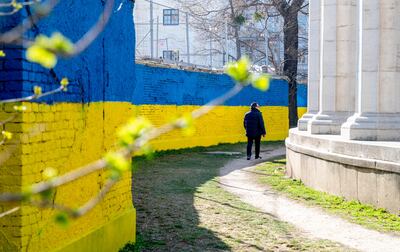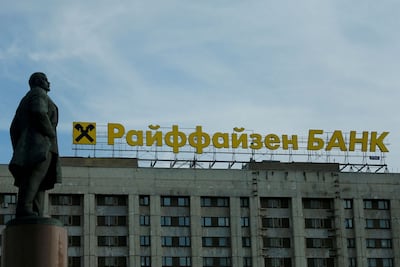In the three decades since the dissolution of the Soviet Union, it has often been remarked, with both surprise and relief, that the world’s second superpower came to an end with remarkably little violence. In the years that followed, small wars erupted periodically at long-standing, often interethnic, fault lines, which settled into today’s so-called “frozen conflicts”, and Russia waged two wars to keep its southern region of Chechnya.
But there was no conflict, as some had feared, along the lines of the civil war that broke out after the Bolshevik Revolution. The 15 Soviet republics went their separate ways in peace.
What Russia describes as a special military operation against Ukraine that began last month has brought about an interstate conflict, which can be seen in many ways as a delayed consequence of the Soviet collapse. Ukraine was one of several Soviet republics to hold an independence referendum in the autumn of 1991, and the overwhelming vote in favour helped make the demise of the Soviet Union inevitable. That December, Ukraine joined Belorussia (now Belarus) and Russia for a meeting that renounced the 1922 Treaty establishing the Soviet Union. Within the month, it was all over.
Except that it wasn’t really over between what became the Russian Federation – legally recognised as the successor state of the USSR – and Ukraine. In practice, in the early years, independence changed relatively little. As a constituent republic of the Soviet Union, Ukraine had a degree of autonomy. It had its own legislature and its own Communist Party organisation and its own figurehead leaders, who occasionally fell out with Moscow on cultural issues. The Communist Party was disbanded, but the republic-level institutions simply became institutions of the new state, and economic ties between Moscow and Kyiv, including gas pipelines, went on pretty much as before. The borders remained almost as open as before, with Russians and Ukrainians routinely passing to and fro.

The differences widened to start with on the political and cultural fronts. But the separation reflected far more change on the Ukrainian than on the Russian side. The first overt political split came with the Orange Revolution in 2004 and 2005, which brought Viktor Yushchenko, a fiercely pro-western candidate, to power. But the decisive break came in 2014, when street protests erupted again, this time over the then president’s refusal – after months of talks – not to sign a primarily economic Association Agreement with the EU.
Again, the fundamental argument was whether Ukraine should face east or west, and the westward orientation prevailed. This time, though, the conflict had descended into violence, and two small areas of the rustbelt Donbas region, in the east of the country, adjacent to Russia, took up arms against Kyiv.
This is the conflict that, eight years later, has provided the initial pretext for Russian President Vladimir Putin to announce Russia’s intervention: to protect the autonomy of those largely Russian-speaking regions, and what Moscow sees as their distinctive culture and ties with Russia.
As has been clear from Mr Putin’s writings and speeches over the past year, however, that his attachment to Ukraine – and, it has to be said, that of many Russians – goes much deeper than affinity with the roughly 5 per cent of the population living in the Donbas. He first aired his thoughts in a long essay published on the Kremlin website in July of last year. His nationwide television address two days before military action began, as well as what was essentially the declaration of war on February 23, went along the same lines.
Mr Putin repeatedly refers to Russians and Ukrainians as being “one people” or “one kin”. He sees them not just as an integral part of the wider Slavonic world, but as having a unique closeness to Russia. And this is because Russia’s origins as a state lie in Kyiv. It was the capital of what is known as Kievan Rus’, a mediaeval state that lasted from the 9th to 13th centuries, comprising much of today’s Ukraine, Belarus and northern and western Russia.
Some interpreted Mr Putin’s sentiments as a statement of intent: that Russia planned to unify Ukraine with Russia, by force if necessary. But Mr Putin is on record, several times, as recognising Ukraine’s status as an independent state. And – for what it is worth – his announcement of military action states that Russia has no desire to change Ukraine’s borders or occupy the country.

What he has said about Ukraine in recent months seemed, to me, rather to reflect regret that Ukraine had chosen to go its own way after 1991 and the hope of eventual reconciliation. Like many Russians, Mr Putin also expressed unhappiness, growing eventually into anger, that Ukraine was increasingly defining itself not just as a separate nation, with its own language, history and culture, but in opposition to Russia, with Russia being presented as the enemy.
Growing Russian resentment about the course being taken by independent Ukraine, however, would not – again, in my view – have been cause for direct intervention were it not for one element. Russia could tolerate Ukraine’s turn towards the West – it made no move, for instance, when Mr Yushchenko became President in 2005. It was the increasing involvement of the Nato alliance in Ukraine’s affairs after 2014 and the defence assistance given by the US and the UK, in particular – not just in training, but increasingly in weapons – that led directly to the conflict we are watching today.
However irrational it may look from the western perspective, Mr Putin (and Russia) saw Nato’s penetration into Ukraine, including into its defence ministry and its armed forces, as a potential threat to Russia’s security and possible preparation for Ukraine to become a platform for Nato to intervene directly in Russia. In response to the western and Nato insistence that the alliance is purely defensive and threatens no one, Russia simply lists Serbia, Afghanistan, Iraq and Libya. It takes for granted that everyone sees these as examples of Nato interventions undertaken without UN authorisation or, in the case of Libya, of distorting and going far beyond the UN Security Council mandate (which had, unusually, not been vetoed by Russia).
The more Ukraine seemed to be integrating into Nato, the more urgent the imperative, as Russia saw it, to pre-empt the latest stage in the expansion of Nato towards Russia’s borders. There is no need to get into the debate about whether Russia was, or was not, given undertakings by the US or Nato that there would be no expansion into the former Soviet states. That is Russia’s firm perception, and no amount of argument will change that.
Russia started trying to secure, as it saw it, its western borders late last year, with proposals contained in two draft treaties presented to the US and Nato in December as a basis for talks about new European security arrangements. Some modest progress was made, but not nearly enough for Russia, which at one point referred to Ukraine’s membership of Nato as a Russian “red line”. Mr Putin also made clear that his concern was not just about “Ukraine in Nato” – a remote prospect, because of divisions about Ukraine’s membership within Nato – but “Nato in Ukraine”.
The prospect of serious talks about European and Russian security receded and a last-minute diplomatic effort by French President Emmanuel Macron came to nothing. Russia’s distress, swelling into fury, about the split with a historical and cultural “brother” makes the current conflict especially bitter. But it was Russia’s fears for its own security, in the face of what it saw as Nato’s inexorable advance, that led it to act against Ukraine. The result will be tragedy for both countries.


